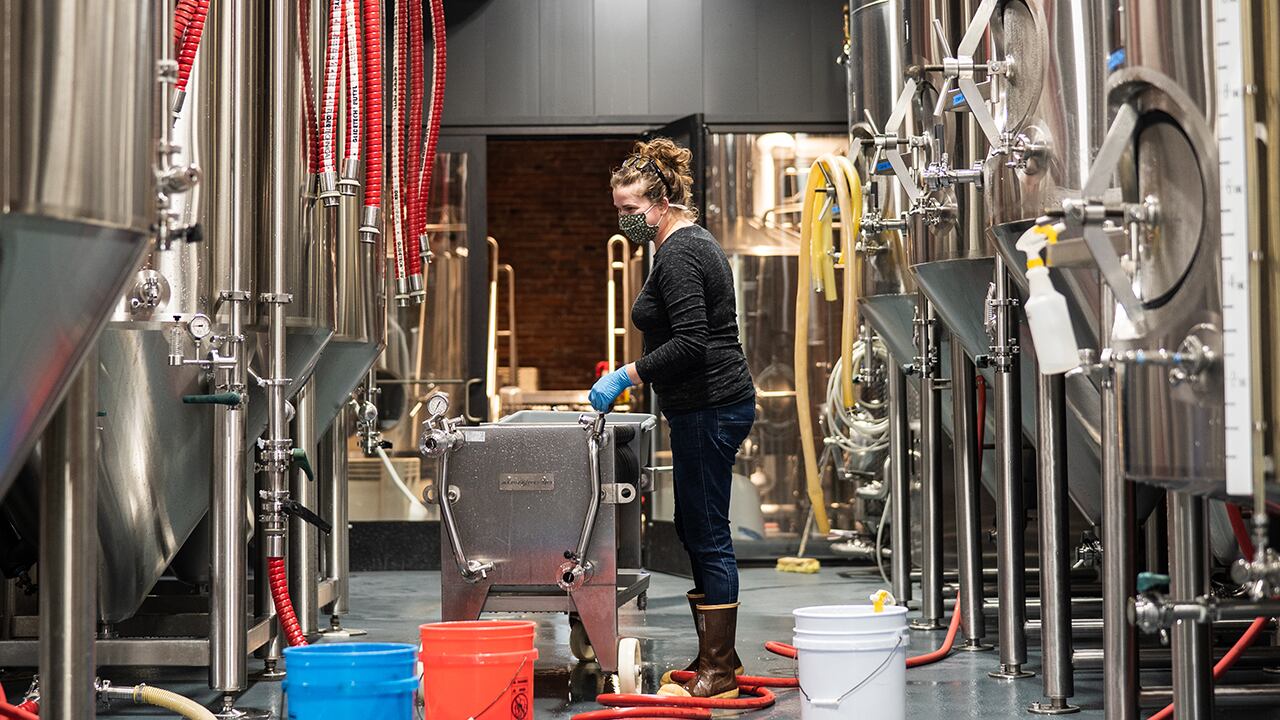While you were scouring store shelves for megapacks of Charmin and jugs of Lysol last spring, Kevin Davey was in a mad scramble to stock up on crowlers.
"There were just no crowlers," Wayfinder's brewmaster explains. "Everybody bought as many crowlers as they could, and they were just selling. We went from doing 20 crowlers a week to 110 crowlers a day or more."
The pandemic created a run on a whole slew of unusual goods, but Portlanders weren't about to quarantine for weeks on end without their favorite beer to help them cope. And brewery operators were more than happy to keep their customer base as comfortably buzzed as possible during a nerve-wracking period of uncertainty.
During the past eight months, local breweries tapped into their teams' creative spirit and developed various paths to profitability, despite limitations on operating hours and capacity upon reopening. Some began selling family-style meal kits; many transformed parking lots and side streets into expanded taprooms.
But the lifeline for pretty much all of them has been selling packaged beer to go. If there is one consistent theme in 2020—other than the rising number of COVID-19 cases and a collective sense of misery—it is that brewers who previously only offered their lagers and ales on draft either started canning and bottling as quickly as possible once the pandemic began to tear through the U.S. or they closed up shop.
"If your model is, 'I'm going to sell pints across the bar and put a heater on, and if nobody comes in, I'm just going to be mad at [Gov.] Kate Brown,' then that's not the right answer," Davey says. "Everybody is experiencing this pandemic and you're going to have to figure out how to sell your product."
For Wayfinder, whose standout German-style beers have made its century-old brick warehouse on the industrial inner eastside something of a destination brewery, the solution was filling and sealing a whole lot of crowlers. But the first few days of closures—which Davey's crew dubbed "Red Tuesday"—mostly felt like a confusing blur.
"Talking to other people who run breweries—Ben [Parsons] at Baerlic and Brenda [Crow] at Little Beast—they both saw the writing on the wall months before it was happening," says Davey. "I felt like I was caught with my pants down about the whole thing. I think that when they canceled the NBA, that's when my heart sank. That means, what isn't on the table to get axed?"
With most of the pub staff temporarily let go, Davey, Wayfinder's general manager and the sous chef quickly fell into a routine: Top up a 32-ounce vessel, run it out to the waiting customer, come back inside, wash hands, repeat. The initial rush to support the business was heartening, even if it caught everybody a bit by surprise.
"I had this moment where it felt like that scene in It's a Wonderful Life, where Jimmy Stewart thinks he's going to lose the bank and then everybody comes in and just, 'Here, here! You can borrow some of my money!'" Davey says. "I had all of these people that, like, I knew they were unemployed at the moment, and they're coming in and buying beer from us."
Going forward, Davey knew that selling more beer more efficiently would mean he needed to ramp up canning. So he called Craft Canning + Bottling and booked as many days as he could with the mobile packager.
"We had very little problem selling most of those cans," Davey explains, "mainly because a lot of people were sitting at home buying cans, so that was really helpful."
Pre-COVID, the brewery would schedule about one packaging run a month, amounting to somewhere between 250 and 300 cases of cans. Now, Davey is filling at least that many containers every week. That means his business is one of a fortunate few in the hospitality industry currently undergoing an expansion. In December, Wayfinder will add three 40-barrel fermenters to its assemblage of eight 20-barrel tanks where the yeast does its work. The new equipment should put Davey on track to pump out 3,500 to 4,000 barrels of beer in 2021, up from 2,000 last year. By increasing capacity, he'll be able to keep the pub's taps flowing when restrictions on dine-in have been lifted, and continue the more aggressive canning campaign—goals Davey couldn't have fulfilled with the current brewhouse.
Portlanders have kept drinking during the pandemic—that much we can be sure about—but how they drink has evolved. As the months have worn on, Davey noticed consumers weren't necessarily coming back for Wayfinder's flagships. They were asking for new stuff, sometimes weird stuff, that under normal circumstances the brewery sales staff could never have moved. Smoked beer in a can? That sold out in a week. A low-alcohol Munich dunkel? There's already a list of pre-orders.
"It's funny, because before the shutdown, we couldn't make enough of our most popular beers: our helles, our Flower in the Kettle [hazy IPA]," says Davey. "Those were the beers that people were really drinking by the gallonful. And right now, it's like, 'Whaddya got that's new?' Because everyone is just buying cans and hanging out in their backyards."
It makes sense to try to break the monotony with whatever tools are available, even if that's a tall boy. While we may be physically restrained this year—and probably well into next—our palates can still roam freely.
Wayfinder's pandemic success has also bucked predictions that the high-end beer market would begin to dry up in this economic downturn. With prices starting at $16 a four-pack, they are hardly budget brews, and rightfully so—a premium lager requires more time in the tank than a style like an IPA, and time is money in brewing. Davey remains optimistic because he's making one of the few indulgences people seem to be willing to spring for right now.
"People always drink beer," Davey explains. "It's not going to the opera, it's not the New York steak with a bottle of wine on a Saturday night. It's a very simple pleasure."
UPDATE: For now, Wayfinder will not offer takeout or dock sales and crowler fills. Davey and his team will continue to brew and can beer, which you can find at local bottle shops.
Portland's Restaurants Were Hanging on by a Thread. What Will They Do in a Holiday Freeze?

